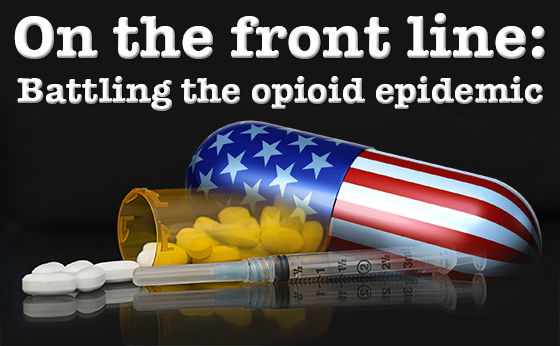|
May – June 2019
A roundup of recent news and information
 Most Americans think drug companies should be held responsible for their role in opioid crisis Most Americans think drug companies should be held responsible for their role in opioid crisis
A new poll by NPR and Ipsos found that 57% of Americans say pharmaceutical companies should be held responsible for making the opioid crisis worse. Additionally, it found that a third of Americans have been touched directly by the deadly opioid epidemic that kills more than 100 people every day. One in three have been personally affected in some way, either by knowing someone who has overdosed or by knowing someone with an opioid addiction, said Mallory Newall, lead Ipsos researcher on the survey. To read more, click here.*
Meijer announces drug take-back program
Meijer recently announced a Consumer Drug Take-Back Program at all its supercenters across the Midwest. At Meijer, you can simply dispose of your old prescriptions during pharmacy hours at secure kiosks. This includes opioids, controlled substances and over-the-counter medications. The Meijer Drug Take-Back Program allows our customers to remove the risk of an unforeseen accident occurring with expired or unused medications, while enabling them to properly dispose of prescription drugs and reducing the possibility of creating a public health hazard, said Jason Beauch, vice president of Meijer Pharmacy. Read more in a MI Blues Perspectives blog.
Forum addresses role employers can play in stemming opioid epidemic
The human costs of the opioid epidemic are substantial, and they trickle down to employers in the form of absenteeism and compromised performance on the job. One study found that opioid abuse costs U.S. employers $18 billion annually in lost productivity. Blue Cross Blue Shield of Michigan recently sponsored a Health Forum of West Michigan panel discussion about opioids. It looked at five key steps employers need to take to help employees struggling with substance use disorders. Read more in a MI Blues Perspectives blog.
Doctors in 5 states among dozens charged with illegally distributing opioids
Dozens of medical professionals in five states, including doctors who allegedly traded prescriptions for sex, were charged with participating in a scheme in which they prescribed more than 32 million opioids and other dangerous narcotics, nbcnews.com* reported April 17. Those indicted include 31 doctors, seven pharmacists, eight nurse practitioners, seven other licensed medical professionals and others who owned, operated or worked at clinics.
In other news, the following items were included in the May issue of The Record. We’re reprinting them here in case you missed them.
CMS develops Medicare Part D opioid mapping tool
The Centers for Medicare & Medicaid Services has developed a Medicare Part D opioid prescribing mapping tool. This interactive tool shows geographic comparisons at the state, county and ZIP code levels of de-identified Medicare Part D opioid prescriptions filled within the U.S. For more information, click here.*
Study explores geographic variation in opioid prescribing
How have key opioid prescription measures changed by state between 2006 and 2017 in the U.S.? A new study, published in JAMA, examines this question. To read more, click here.*
New law makes it easier for patients to refuse opioids
Michigan has enacted a law that allows people to refuse opioid medications by placing a non-opioid advance directive in their medical file, the Detroit Free Press reported March 28. For details, click here.*
Bloomberg gives Michigan $10 million to fight opioid crisis
Former New York Mayor Michael Bloomberg traveled to Michigan in March to announce a $10 million contribution to the state’s efforts to fight the opioid crisis, the Detroit Free Press reported. The money will come from Bloomberg Philanthropies, which will partner with up to 10 states over the next three years and invest $50 million to support state programs to develop treatment and prevention programs. To read more, click here.*
In a related item in The Detroit News, Bloomberg and Michigan Gov. Gretchen Whitmer wrote an opinion piece* on what state governments have been doing and Michigan’s fight to combat the opioid crisis.
Michigan schools stocking first-aid kits with Narcan®
A number of Detroit-area schools are stocking their facilities with Narcan, the overdose-reversing drug, and training school staff to use it, the Detroit Free Press reported March 14. To read more, click here.*
*Blue Cross Blue Shield of Michigan doesn’t own or control this website.
|


 Most Americans think drug companies should be held responsible for their role in opioid crisis
Most Americans think drug companies should be held responsible for their role in opioid crisis